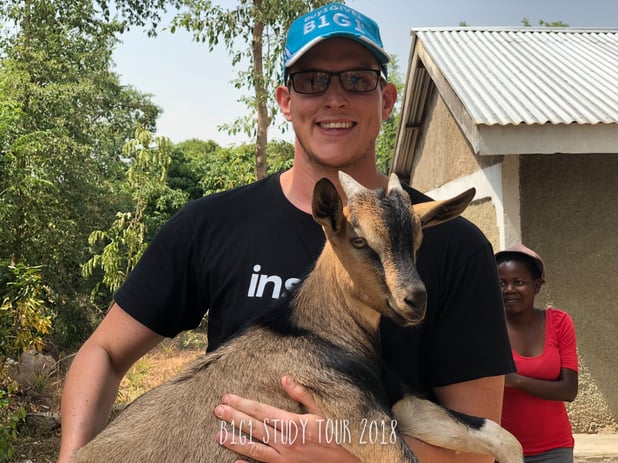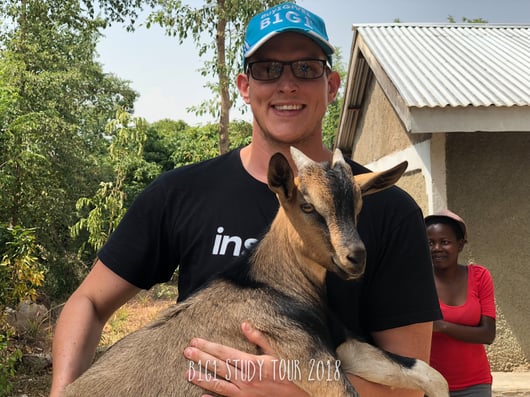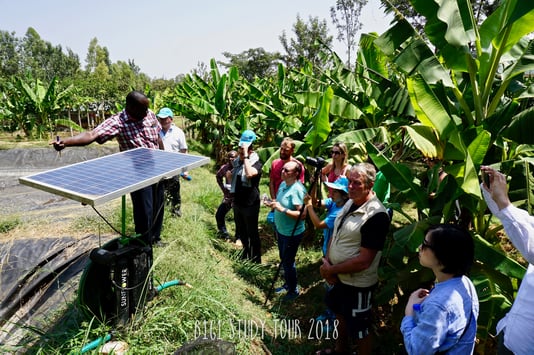Tax on Bitcoin and Cryptocurrency
Background of Bitcoin and Cryptocurrency
Tax on Bitcoin and Cryptocurrencies
Bitcoin and cryptocurrency as a Capital Gains Tax Asset
1. Tax for Passive Bitcoin and Cryptocurrency Investors
2. Tax for Active Bitcoin and Cryptocurrency Traders
Using business structures to trade Bitcoin and Cryptocurrencies

- Sole Trader: If you buy and sell bitcoin or cryptocurrencies in your own name, you can be taxed at the highest marginal tax rate of 47% tax.
- Companies: Or if you run your business through a company, you can pay tax at either 27.5% or 30% tax, depending on your turnover.
- Trusts: if you structure it through a trust, you basically distribute profit from that trust to family members, or other entities (like other companies) in your family group.
Record keeping of Bitcoin and Cryptocurrency trading
B1G1 Study Tour to Kenya
Property Development in Kenya
We visited Aberdare Ranges Primary school on Day 2, then we drove up the road to the village which is where most of the children live.
We learned that much of the poverty and displacement was due to political violence in 2007. Due to an election, if you didn’t vote for the right person your house could be burned down and you could even be killed! Crazy stuff – but real. So it caused a lot of families to head out of the towns, and into the rural areas away from the violence.
But what was great to hear is after the political violence broke out, the Kenyan government gave each family around $100 USD to rebuild their lives.
Now there was an extremely entrepreneurial chief who suggested 1,000 families combine their $100 USD, and buy a big block of land.
From memory, this land was around 5 or 6 acres, and they got a town planner in to create roads, and blocks for each of the families to live on.
Each block has enough room for a very small house, but it was this coming together that created a community – that now 10 years on is thriving.
The kids are getting a great education only 20 minutes walk up the road, and this will mean the kids getting jobs, and bringing money back to this community.
The community even has its own medical centre, seeing 80 patients a day. All of this possible with that chief having his entrepreneurial thought process developing the land.
A hand up, rather than a hand out
One of the more well known projects in B1G1 is the ‘Goat Project‘, which we visited on Day 6.
We think it’s about the meal we’re giving; but it’s so much more.
This project is the hardest one for me to talk about, type about, or even think about.
3 Steps to Transition to Cloud Accounting
How do you move to Cloud Accounting?
The transition from a desktop based accounting system to a cloud accounting package is an art.
1. Choose your cloud accounting package
Firstly, you will want to make sure you’ve chosen the right package for your business. The best way to do this is to discuss your needs with an adviser.
Sidenote: there are many accounting firms and advisers who align themselves with only one brand (we were one of them!). Remember that it needs to be the best fit for your business, rather than the one with the most hype.
2. Prepare for the transition
Having helped over 100 businesses implement cloud solutions, the transition can be a bumpy ride.
I heard a saying recently from a friend who served in the military, “Time spent in reconnaissance is seldom wasted”. This saying remains true when transitioning to the cloud.
You need to consider:
- The date that you will transition to the cloud (called the ‘conversion date’)
- Training for your accounting team
- Other applications that will synchronise with your accounting package
- Support required for the first few months from your accountant
- Additional time you will need to get used to the system
We find that the first few weeks of implementing cloud accounting software can be draining, and we offer 24 hour turnaround support through our help center. We strongly encourage you to stick with it though, as after that on-boarding period, things are a breeze!
3. Take the leap
Once you’ve done all of your preparation and ideally worked in with your adviser, you’re ready to take the leap.
Ideally, you will have had the training before the conversion date, and your accountant will have set up the accounting package ready for you to start working in.
So step 3 is relatively easy – log in, and start crunching away! Oh, and don’t forget to lean on an adviser that has experience in your accounting package.
Question 2: Holidays (7:28)
HARVEE: I love it. Grossly simplified, but that’s actually the power in the process. It’s very cool, let’s go onto the next one then, which is one of my favorite topics. What was the Holidays button there Ben?
BEN: Yeah, yeah, I got reminded of it this morning actually. We want to work out, throughout the year, planing around the seasonalities in your business, when are you going to take your holidays? Something I have been guilty of is actually not looking after myself and what that turns into is low health. Health is the first thing to go which means then that has the effect on your mind and business performance as a result. Holidays is putting yourself as a priority. A time where you switch off and focus on you and your family. What Harvee and I did, was blank out some dates in our calendar and where we want to go on those dates, to treat ourselves and to yeah, just have some time off the business.
HARVEE: Very good. Where are you heading in March for?
BEN: Yeah, for Stevie and I’s first anniversary, we’re heading to Italy. We booked the flights just before Christmas and I’m super excited for that.
HARVEE: Yeah, I’m happy for you too. It’s a priority, we’ve got to make it happen. I’m just coming down off of very good high of a month off in December, last year and I traveled around my own beautiful country, New Zealand, in the South Island and it was just magic. Again, as Ben described, it’s your own way to sharpen the axe, as they say in terms of becoming a greater person and more fulfilled and complete. Also, a mentor of mine, who I used to work alongside, he had a very strong mantra where he always believed that it was really important to take four annual holidays, no questions asked, of at least two weeks per trip. He had his unique cycle of locations that he went to. In addition to all the really logical justifications, not that you might need many for holidays, he said as a business owner, what was really important is again, an opportunity to get out of the way for the rest of the team and to recognize where the gaps in both his team and recognize the gaps in his systems within the business.
When he came back, he saw where the problems were and were able to fix that. Whereas if you’re always there and always, for lack of a better word, in the way, there’s not opportunity for people to step up and make decisions in your absence. If you were looking for any more reasons to prioritize holidays in your life, then there’s some more additional ones for your business. Very cool.
Question 1: Profit (4:45)
With that in mind,weI might start with that first one, Profit. What we’re talking about there is how much you’d like to take out of the business in the next 12 months. Whether that’s 100 grand, 200 grand, 300 grand, but putting a target or a number down. Yeah, something to aim for.
BEN: Yeah, it sure is. It’s a strategy where, for every dollar that comes in the business automatically you put a few percent straight away into a separate profit account. You don’t actually put it in there, pay your expenses and then whatever’s left is your profit. If 10 grand comes in, you put automatically $1,000 into your profit account. Just like many people do with GST, automatically over to the side. Profit’s out first and then whatever’s left is to pay your expenses with.
HARVEE: Yeah. It’s quite reminiscent also of the Richest Man in Babylon, that was the classic personal wealth process in terms of paying yourself first. Why couldn’t that same idea apply to a business. Yet, I don’t think many people take the time to question, well what would a beautiful lifestyle look like? What would that actually cost? Therefore, how would we use our business in such a way to specifically fund that very clearly defined lifestyle? This is what lifestyle design is all about. Ben, just on that, once you do pluck whatever your magic number is, what form and effect might that have been to what the sales team might do today or what team we might have working in the business day to day?
BEN: Yeah, yeah. Once you know your profit, and this doesn’t have to be a crazy process. Harvee and I did this on one eight four page with the iPhone as a calculator. We got the profit that we wanted to each take out of the business, all the expenses to run the business, and that gave us an overall revenue target. Now if you’ve got an idea of your average client value, let’s say that’s 10 grand, and let’s just say 300 grand was your revenue target, then you only need 30 clients to deliver your profit target and pay all the bills. Then, with that 30 clients in mind, your marketing and sales team can say, “All right, well how many do we need a month.” That’s their KPIs to achieve the business’ and your lifestyle and profit goals.
Question 3 and 4: Ins and Ons (10:00)
Let’s go into Ins and Ons please Ben.
BEN: Yes. What those two dots, the In and On mean is time spent in the business versus time spent on the business. This concept is shared in a book written by Michael Gerber called the E-Myth where usually people spend too much time in the business that they never get time to build it and look at those systems and fill the holes where they need to.
HARVEE: That’s right. If I could just add there too Ben, the rationale behind that is, and if you’ve read Michael Gerber’s stuff you’ll understand, is that most people go into business because let’s say they’re a great smoothie maker or they’re a great accountant, or architect or marketer. They’ve got a technical skill and they think, you know what? I could run a business and they don’t realize all the other pieces that are involved in doing that. What ties you all, gives you a tendency to want to work in the business is because you can actually do those technical pieces. I understand the struggle, it is in actually taking your hands off. Have you found that Ben in letting go of some of the tax and technical stuff in the last six months?
BEN: Yeah, that’s right. You’re always learning what you need to get out of the way from. Yeah, business is great. You need to prioritize the on time and it’s just such a default, like a human condition default. Where we resort back to our technical or where we came from. We must take time, really disciplined to work on the business.
HARVEE: Understood. I read a book, Four Hour Work Week by Tim Ferris, and his recommendation was to straightaways go Mondays and Wednesdays are off and out of the business. Now, Ben and I won’t know exactly how to pull that off straight away, but what we’ve been doing consistently for the last, let’s say four months would you say Ben? Is our unique thing of what we call WOW, or Work on Wednesday. That’s the day that we’re out of the office and we’re specifically working on the business and on projects based around creating systems or creating marketing content or strategizing new product lines or ways to improve our existing product lines and letting the team members keep running ahead with working in the business side of things.
For the context of this, let’s get a predefined goal of what are the days you want to be working in the business and what are the days you want to be working on. For the days you are in the business, what are the times that you want to aim for. This is helping us be able to construct what an ideal week might look like for you. Ben, let’s get onto the final point in this really important considerations and that is Retreats.
Question 5: Retreats (12:36)
BEN: Yes, yes, and you might look at this as an excuse to go somewhere lovely, but it’s exactly what we’re talking about at the start, where Stevie and I and Harvee went away for a couple of days with the sole focus of relaxing and also working on the business. Yeah, taking ourselves away from our normal working and home environments. What we did is, how many of these retreats do we want each year? We’ve also booked in some time to take them. I reckon they’re so powerful and Harvee’s going to share one of the two big things shortly, that we made a decision on for this year. That wouldn’t have happened undoubtedly, if we weren’t in Northern New South Wales, surrounded by some lush green fields of grass. Yeah.
HARVEE: That’s so funny. For everyone who knows what’s common in Northern New South Wales, it’s not what we were talking about. Very cool. Just on those retreats, what is the tax implications of that? We went away, spent four days, we spent however much money what was invested in that side of things. We were working on the business specifically, but also having a bit of fun. What are the tax implications, is there another benefit or justification in taking these retreats from a tax perspective?
BEN: Yes, being careful. Part of those retreats is what you can claim. The part is, there might be a blog article on very shortly.
HARVEE: Yeah, awesome, cool, thanks very much for that. If in doubt, seek advice from your taxation professional and make those decisions wisely. Any other things you wanted to mention Ben before we move on at the end of our webinar today?
BEN: Yeah, I think that’s, we’re all good to keep moving.
Conclusion (14:37)HARVEE: Yeah, beautiful. There are the five considerations that I want you guys to give the gift to yourself of having at least, it doesn’t have to be perfect, and a wonderful five page plan. It can look as simple as some notes in your iPhone, or a little piece of paper where we’re scribbling these key numbers down. What is the magic number around profit? What would an ideal year look like in the terms of the number of holidays? Even get excited about the locations and the duration of them. Think about what an ideal week might look like? Is it Monday, Tuesday, Thursday, Friday in the office and are those in times between seven and four, or is it even earlier so you can get home to pick up the kids? Is Wednesdays your work on the business day where you WOW like we do? Or do you have another day or another time that that’s done? Also, what are some excuses, or what are some pre-planned triggers that if no questions asked, if you don’t do the WOWs or the working on your business during the weeks, that at least every year you’re taking some time out, either with your business partner or yourself, or with the team as well, to actually have a plan about where we’re heading in that next period. With the keyword, or the key part of that word being treats. It is a treat and I don’t think we should shy away from that in business. We work our butts off and deliver a great value for ourselves and for our community and you absolutely deserve to be treated. That’s the end of our webinar. I wanted to give you guys a heads up on what’s coming up this month. I also want to ask for some help please. One of the things that Ben and I worked on in our work on the business was a one day workshop that we’re going to be rolling out this year for small business owners. That’s because we received a lot of feedback in the last 12 months about how business owners are in business, and they’re doing what they do, but they don’t really have firm control on the numbers. They aren’t actually numbers people and they want to get an understanding about what are the key numbers that we can set up, whether it be in calculations and lifestyle design, whether it be calculations and profit, or whether it be setting up key KPIs for the team members so that we’ve got this numbers based machine that’s running and pushing and helping us create a beautiful business. We’ve put together this business workshop and we’re running our first beta workshop in about two weeks time. Before I release this invitation to the world, if you like, in terms of coming on to that very first workshop, I really would love some feedback. If you guys are willing to give me an email address that I could flick you through the agenda. Please don’t share it with anybody yet, until I share it with the world. I’m just looking for a bit of perspective. Ben and I were in that zone in burn, but we want some second opinions on what else absolutely must be included in this workshop. If you’re willing to give me some feedback, either by email or a quick phone call after you’ve read through the agenda, I’d really appreciate that a lot. The way you can help us out, if you’re willing to do so is email hello@inspireca.com and I’ll get that and say, “Yeah, I’m willing to help and give you my two cents worth on the Cash Rich Business workshop.” I’ll send you through the agenda and if you can give me some feedback on what we absolutely must put in there, then I’d really appreciate that from whatever perspective you’re coming from. Whether it be a small business owner, or whether it be an accounting firm who may be in today’s session as well. The other heads up that I want to give you, especially if you’re a local here in Bris Vegas, if you haven’t heard, we have an Inspire meetup. They became very famous in 2015, we are absolutely bringing them back in a big way in 2016. Our first Inspired meetup is next Thursday afternoon at 4:30 pm. It’s an Australia Day themed meetup in which we’re celebrating great Australian businesses. We’ve got a great special guest speaker who is the founder of a very powerful movement here in Brisbane called Entrepreneurs of Brisbane and you’re going to love the message he’s got to share in celebrating all great things Australian. We’re also going to have lamingtons and meat pies and I think Ben’s dad is going to bring some sausage and have a barbie down there. This is a great opportunity for small business owners to come and connect and meet each other and network and share ideas about what’s working for them. We’ve got some really powerful meetups coming up this year. In fact, just a little bit of snippet. Jessica, who’s our event coordinator is on the phone with Warner James today, speaking about how we might be able to get some pretty powerful names and identities and profiled business owners to be able to share their unique stories. Definitely stay close if you want to be inspired about creating a great business this year. Thanks very much everybody for attending our first webinar. Happy New Year and welcome back. Again, give yourself that gift of taking the time, go out and grab a coffee now if you have to. Scribble down with your pen those five things. What profit do I want this year, what holidays do I want to commit myself to taking this year and next, how much time do I want to spend working in and on the business, and what about specific excuses like retreats or conferences, perhaps, could I attend that will give me the accountability to working on my business. Not just continually during the week, but to break up my year in one, two, or three segments. Give yourself that gift and I look forward to boosting collectively our profits in 2016. Thanks guys, we’ll see you next month or next Thursday at our meetup. |















